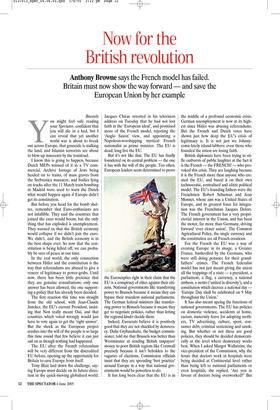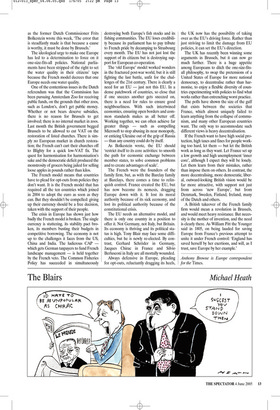Now for the British revolution
Anthony Browne says the French model has failed. Britain must now show the way forward — and save the European Union by her example Brussels You might feel safe reading your Spectator, confident that you will die in a bed, but I can reveal that yet another world war is about to break out across Europe, that genocide is stalking the land, and Islamist terrorists are about to blow up innocents by the trainload.
I know this is going to happen, because Dutch MEPs warned of it in a TV commercial. Archive footage of Jews being herded on to trains, of mass graves from the Srebrenica massacre, and bodies lying on tracks after the 11 March train bombing in Madrid were used to warn the Dutch what would happen again if Europe didn’t get its constitution.
But before you head for the bomb shelter, remember that Euro-enthusiasts are not infallible. They said the countries that joined the euro would boom, but the only thing that has exploded is unemployment. They warned us that the British economy would collapse if we didn’t join the euro. We didn’t, and the British economy is in the best shape ever. So now that the constitution is being killed off, we can probably be sure of peace in our time.
In the real world, the only connection between Hitler and the constitution is the way that referendums are abused to give a veneer of legitimacy to power-grabs. Until now, there has been little pretence that they are genuine consultations; only one answer has been allowed, the one supporting a policy that has already been decided.
The first reaction this time was straight from the old school, with Jean-Claude Juncker, the EU’s current President, insisting that Non really meant Oui, and that countries which voted wrongly would just have to vote again to get the ‘right answer’. But the shock as the European project crashes into the will of the people is so large this time round that few believe it can just sail on as though nothing had happened.
The EU after the French referendum will be very different from the discredited EU before, opening up the opportunity for Britain to save Europe from itself.
Tony Blair laid down the challenge, saying Europe must decide on its future direction in the quick-moving globalised world. Jacques Chirac retorted in his television address on Tuesday that he had not lost faith in the ‘European ideal’, and promised more of the French model, rejecting the ‘Anglo Saxon’ view, and appointing a Napoleon-worshipping mystical French nationalist as prime minister. The EU is dead; long live the EU.
But it’s not like that. The EU has finally foundered on its central problem — the one it has with the will of the people. Too often, European leaders seem determined to prove the Eurosceptics right in their claim that the EU is a conspiracy of elites against their citizens. National governments like transferring power to Brussels because it means they can bypass their truculent national parliaments. The German federal ministers like transferring power to Brussels because it means they get to negotiate policies, rather than letting the regional linder decide them.
Indeed, Eurocrats believe it is positively good that they are not shackled by democracy. Dalia Grybauskaite, the budget commissioner, told me that Brussels was better than Westminster at sending British taxpayers’ money to poor British regions like Cornwall precisely because it isn’t beholden to the vagaries of elections. Commission officials insist that they are spreading ‘best practice’ around Europe in a way that national governments would be powerless to do.
It has long been clear that the EU is in the middle of a profound economic crisis. German unemployment is now at its highest since Hitler was abusing referendums. But the French and Dutch votes have shown just how deep the EU’s crisis of legitimacy is. It is not just we Johnnycome-lately island-lubbers: even those who founded the union are losing faith.
British diplomats have been trying to stifle outbursts of public laughter at the fact it is the French — the FRENCH! — who provoked this crisis. They are laughing because it is the French more than anyone who created the EU, and based it on their own technocratic, centralised and elitist political model. The EU’s founding fathers were the Frenchmen Robert Schuman and Jean Monnet, whose aim was a United States of Europe, and its greatest force for integration was the Frenchman Jacques Delors. The French government has a very proprietorial interest in the Union, and has been the motor, far more than Germany, driving forward ‘ever closer union’. The Common Agricultural Policy, the single currency and the constitution are all French creations.
For the French the EU was a way of creating Europe in its image, a Greater France, bankrolled by the Germans, who were still doing penance for their grandfathers’ crimes. The French federalist model has not just meant giving the union all the trappings of a state — a president, a parliament, a flag, a currency, a national anthem, a motto (‘united in diversity’), and a constitution which decrees a national day — ‘Europe Day shall be celebrated on 9 May throughout the Union.’ It has also meant apeing the functions of national governments. The EU has policies on domestic violence, accidents at home, racism, maternity leave for adopting mothers, TV advertising, culture, sport, consumer debt, criminal sentencing and smoking. But whether or not these are good policies, they should be decided democratically at the level where democracy works best. When I asked Margot Wallstriim, the vice-president of the Commission, why the hours that doctors work in hospitals were being decided at Continental level rather than being left to national parliaments or even hospitals, she replied, ‘Are you in favour of doctors being overworked?’ But as the former Dutch Commissioner Frits Bolkestein wrote this week, ‘The error that is steadfastly made is that because a cause is worthy, it must be done by Brussels.’ The ideological urge to make one Europe has led to a determination to force on it one-size-fits-all policies. National parliaments have been stripped of the right to set the water quality in their citizens’ taps because the French model decrees that one Europe needs one water quality.
One of the contentious issues in the Dutch referendum was that the Commission has been pursuing Amsterdam Zoo for receiving public funds, on the grounds that other zoos, such as London’s, don’t get public money. Whether or not bears deserve subsidies, there is no reason for Brussels to get involved; there is no internal market in zoos. Last month the British government begged Brussels to be allowed to cut VAT on the restoration of listed churches. There is simply no European market in church restoration; the French can’t cart their churches off to Blighty for a quick low-VAT fix. The quest for harmonisation for harmonisation’s sake and the democratic deficit produced the monstrosity of grocers being jailed for selling loose apples in pounds rather than kilos.
The French model means that countries have to plead for opt-outs from policies they don’t want. It is the French model that has required all the ten countries which joined in 2004 to adopt the euro as soon as they can. But they shouldn’t be compelled: giving up their currency should be a free decision, taken with the support of their people.
The crisis in Europe has shown just how badly the French model is broken. The single currency is stuttering, its stability pact broken, its members busting their budgets in competitive borrowing. The economy is not up to the challenges it faces from the US, China and India. The ludicrous CAP which gets German taxpayers to fund French landscape management — is held together by the French veto. The Common Fisheries Policy has succeeded in simultaneously destroying both Europe’s fish stocks and its fishing communities. The EU loses credibility because its parliament has to pay tribute to French pride by decamping to Strasbourg every month. The EU has not just lost the support of its citizens but is destroying support for European co-operation.
The ‘old Europe’ model worked wonders in the fractured post-war world, but it is still fighting the last battle, unfit for the challenges of the 21st century. There is clearly a need for an EU — just not this EU. In a dense patchwork of countries, so close that if one sneezes another gets sneezed on, there is a need for rules to ensure good neighbourliness. With such intertwined economies, ensuring open borders and common standards makes us all better off. Working together, we can often achieve far greater things — such as compelling Microsoft to stop abusing its near monopoly, or enticing Ukraine out of the grip of Russia — than any country could do by itself.
As Bolkestein wrote, the EU should ‘restrict itself to its core activities: to smooth the path for economic exchange between member states, to solve common problems and to create advantages of scale’.
The French were the founders of the family firm, but, as with the Barclay family at Barclays, there comes a time to relinquish control. France created the EU, but has now become its nemesis, dragging Europe down with it. It lost its moral authority because of its sick economy, and lost its political authority because of the constitutional crisis.
The EU needs an alternative model, and there is only one country in a position to offer it. Not Germany, not Italy, but Britain. Its economy is thriving and its political status is high. Tony Blair may face some difficulties, but he is newly re-elected. By contrast, Gerhard Schröder in Germany, Jacques Chirac in France and Silvio Berlusconi in Italy are all mortally wounded.
Always defensive in Europe, pleading for opt-outs, reluctantly dragging its heels, the UK now has the possibility of taking over as the EU’s driving force. Rather than just striving to limit the damage from EU policies, it can set the EU’s direction.
The UK has recently been winning some arguments in Brussels, but it can now go much further. There is a huge appetite among Europeans to ditch the one-size-fitsall philosophy, to swap the pretensions of a United States of Europe for more national democracy, to decentralise rather than harmonise, to enjoy a flexible diversity of countries experimenting with policies to find what works rather than entrenching worst practice.
The polls have shown the size of the gulf that exists between the societies that France, which almost uniquely failed to learn anything from the collapse of communism, and many other European countries want. The only way to accommodate such different views is heavy decentralisation.
If the French want to have high social protection, high taxes and fines for people working too hard, let them — but let the British work as long as they want. Let France set up a low growth and high unemployment ‘inner core’, although I expect they will be lonely. Let them learn from their mistakes, rather than impose them on others. In contrast, the more decentralising, more democratic, liberal, outward-looking British vision would be far more attractive, with support not just from across ‘new Europe’, but from Denmark, Sweden, Finland, Ireland, many of the Dutch and others.
A British takeover of the French family firm would mean a revolution in Brussels, and would meet heavy resistance. But necessity is the mother of invention, and the need is clearly there. As William Pitt the Younger said in 1805, on being lauded for saving Europe from France’s previous attempt to unite it under French control: ‘England has saved herself by her exertions, and will, as I trust, save Europe by her example.’ Anthony Browne is Europe correspondent for the Times.



















































 Previous page
Previous page